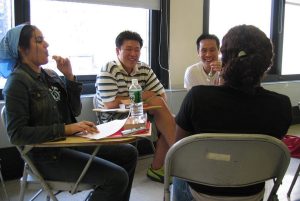
Like many of you, I have taught pronunciation from some books. You know, the ones that have the schematic diagrams of where the tongue is supposed to go. I’ve even seen some teachers have mirrors in their classroom so the students can see the acrobatics going on in their mouth. Does this method work? I suppose so, but I find it really boring. I know it isn’t fun for the students because it certainly isn’t fun to teach. One day, I decided to try something different. I don’t think this would work for lower level students, although I would like to try.
I really am a fan of Seinfeld. What I like about the characters is that they are over the top when they deliver their lines, even more than most comedies. I thought I would experiment with a scene from this TV show to see how it would work with my students. Continue reading



